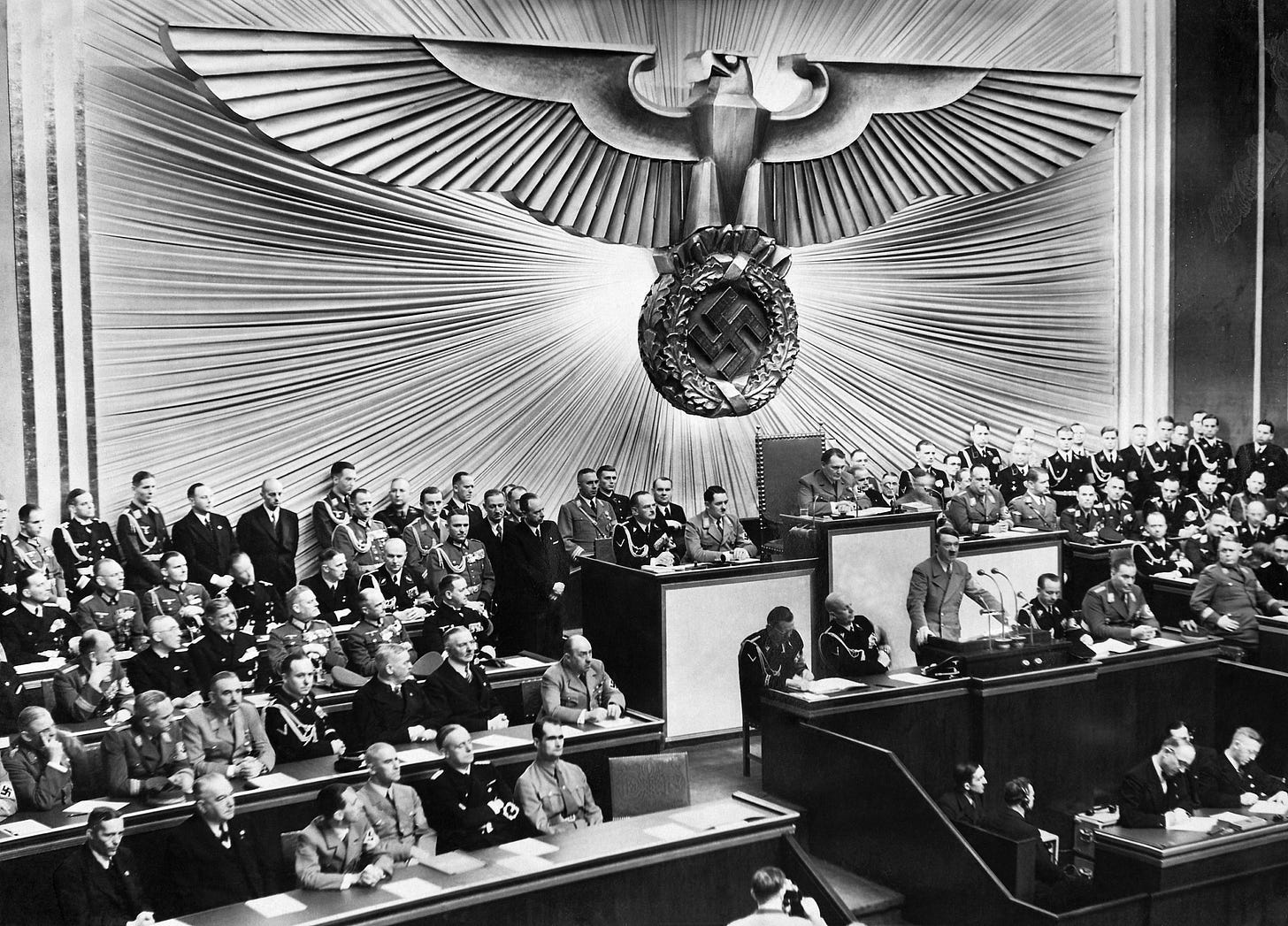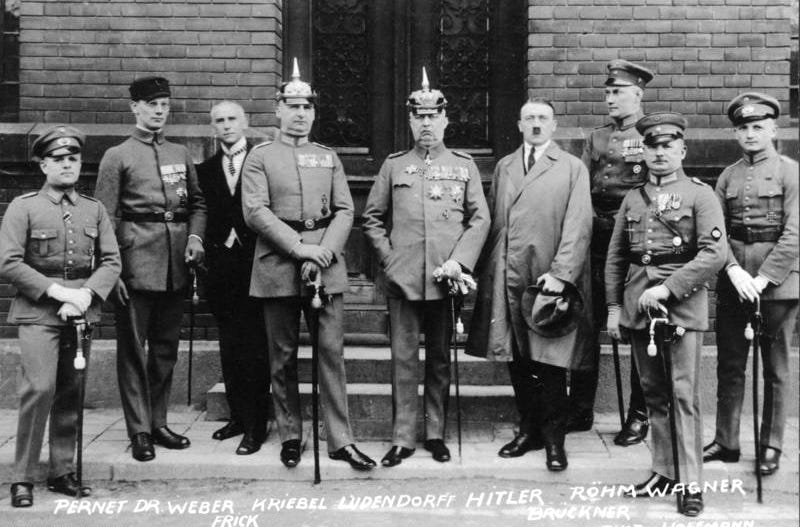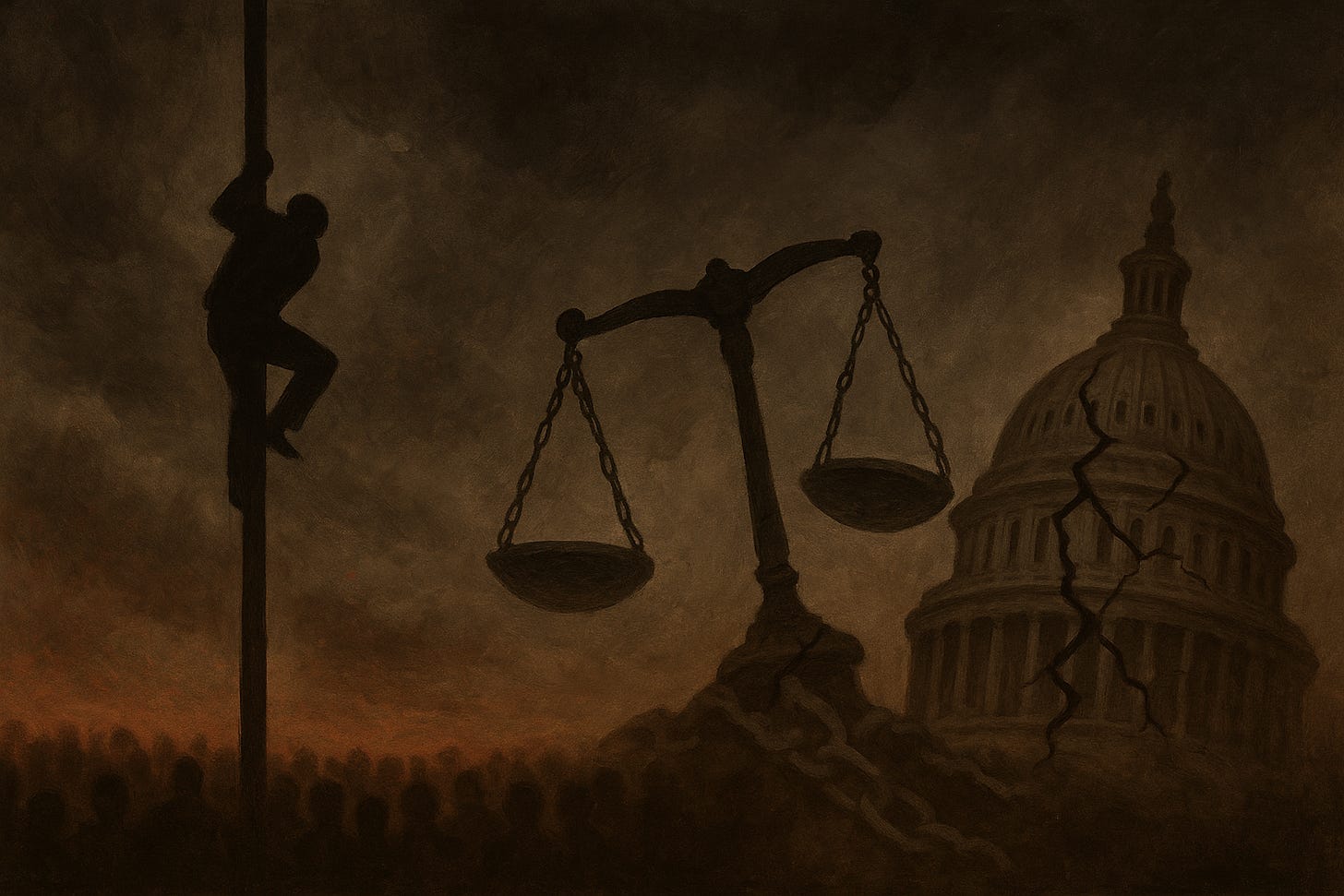Chapter 55: The Path to Power
How Hitler and Trump Got to "The Top of The Greasy Pole"
Although in different nations and a century apart, the path to power of Hitler and Trump has some remarkable similarities. Both were long shots to ascend what Benjamin Disraeli (1804 – 1881), twice the Prime Minister of the United Kingdom, memorably called “the top of the greasy pole.”1 Both broke the system which they mastered. Both were felons. Both attempted violent takeovers of the government before ultimately coming to power legally. Both targeted groups within society – Jews in Hitler’s case, and immigrants in Trump’s – and said outrageous things about them in order to demonize them. Both Hitler and Trump were merchants of hate.
This chapter will focus on one aspect of the rise to power of these two men: The failure of gatekeepers. By gatekeepers, I mean individuals and institutions that should have prevented their attainment of power. Trump II is different from Trump I. The United States survived Trump’s first term with most of its institutions intact, despite the damage he did to them. There is reason to doubt that the country will be as fortunate with Trump II, so 2024 is more important than 2016.
Let us turn first to Hitler.

“Just like a fairytale.”2 That is how Joseph Goebbels (1890 – 1945), who became Hitler’s chief propagandist, described Hitler’s becoming Chancellor on January 30, 1933. There was nothing inevitable about this.
Hitler was born on April 20, 1889, in Austria, in which he lived until moved to Munich in 1913. (He spoke German with an Austrian accent.)3 He tried twice to gain admission to the Vienna Academy of Fine Arts as a student, but “they rejected me, they threw me out, they turned me down.”4 While living in Vienna, he learned what it meant to be on the bottom rung of the ladder of life.
Here is a description of him in 1909. “[T]hin and bedraggled, in filthy, lice-ridden clothes, his feet sore . . . Hitler joined the human flotsam and jetsam finding their way to the large recently established [flop] house for the homeless. . . . The social decline of the petty-bourgeois [Hitler’s family of origin was middle class] so fearful of joining the proletariat was complete. The twenty-year-old would-be artistic genius had joined the tramps, winos, and down-and-outs in society’s basement.”5
Hitler raged at his predicament and unleashed “tirades of hate directed at everything and everybody.”6 He shunned intimacy, and his obsessive speechifying helped keep people at arm’s length. A target of his self-important blather once said, “Tell me, have they shit in your brain and forgotten to flush it?”7
Things looked very different when Paul Ludwig Hans Anton von Beneckendorff und von Hindenburg (1847 – 1934), President of Germany, asked Hitler to become Chancellor in 1933. “What few beyond the ranks of Nazi fanatics had thought possible less than a year earlier had become reality. . . . The ‘nobody of Vienna’, ‘unknown soldier,’ beer hall demagogue, head of what was for years no more than a party on the lunatic fringe of politics, a man with no credentials for running a sophisticated state-machine, practically his sole qualification the ability to muster the support of the nationalist masses whose base instincts he showed an unusual talent for rousing, had now been placed in charge of government of one of the leading states of Europe.”8
This catastrophic result could not have happened without the collapse of the gatekeeping function. Hitler was jailed in 1922 for disrupting a political meeting and breaching the peace. He served one month of a three-month sentence and did not have to serve the other two months to which he had been sentenced “against future good behavior,”9 a condition which was quickly forgotten.
On November 8–9 of 1923, Hitler attempted to overthrow the government of Germany. The failure of what was known as the “Beer Hall Putsch” was complete. Four policemen and 14 putschists lost their lives in a gunfight on the streets of Munich.

Despite having attempted the violent overthrow of the government, Hitler was handled with kid gloves. He was charged with treason; however, “[h]e was allowed to turn the courtroom into a stage . . . not merely justifying but glorifying his role in attempting to overthrow [the government].”10 Hitler could have been deported to Austria, where he was still a citizen. But the judges declined to do so because, they wrote, Hitler “considers himself to be a German.”11 Indeed, Hitler did not renounce his Austrian citizenship until April 30, 1925; and it was not until February 26, 1932, eleven months before he became Germany's Chancellor, that he finally became a citizen of Germany. Between 1925 and 1932, he was a stateless person.
Charged and convicted of committing treason, Hitler received a sentence on April 1, 1924, of only five years in the German equivalent of “Club Fed.” Though not legally eligible for parole, he was nevertheless out of prison on December 20.
The legal system of Germany, which certainly should have served as a gatekeeper to politics and government, failed utterly in that role. The country could have gotten rid of Hitler in 1924.
The story of Hitler’s eventual ascent to power in 1933 is equally distressing. By the end of 1932, it appeared that the Nazi Party’s tide was receding. However, the political elite convinced itself that it could exploit Hitler’s rabble-rousing for its own ends. One of these people said of Hitler that “We’ve hired him.” Another explained that “We’re boxing Hitler in.”12
In the words of one historian, “Far from being inevitable, Hitler’s success owed much to luck and even more to the bad judgment of his political opponents and rivals.” He “did not seize power; he was jobbed into office by a backstairs intrigue.”13 The members of the political elite, who should have protected the nation, concluded that they could exploit Hitler for their own ends. This dreadful misjudgment “reflected an underestimation of and contempt for Hitler corresponding to an ingrained overconfidence in the ability of the ‘natural’ governing classes to control the upstarts.”14
The similarity to Trump’s rise to power is as clear as it is deeply troubling. Trump lost the 2020 Presidential election and tried violently to seize power on January 6, 2021. His attempted coup cost lives and was a flop. He should have wound up in jail, but instead he has wound up back in the White House. He boasted in his second inaugural address that:
Many people thought it was impossible for me to stage such a historic political comeback. But as you see today, here I am.15
As was the case with Hitler, the gatekeepers failed our nation with regard to Trump. Section 3 of the 14th Amendment to the Constitution holds that no person having taken an oath to support the Constitution of the United States and then engaging in an insurrection could ever hold office in the future.16 The Supreme Court chose to ignore this clause, and it is now a dead letter.
Just as the law failed to rein Hitler in, it failed miserably with regard to Trump. He was indicted but never convicted for trying to steal the election in Georgia and for the insurrection in Washington, DC.
Trump was impeached for the second time following his attempted violent overthrow the government on January 6, 2021. Astonishingly, however, he was acquitted in the Senate by a vote of 57 to 43. A two-thirds majority is required to convict an impeached president. Senate minority leader Mitch McConnell in a speech on the Senate floor declared that Trump was entirely responsible for the January 6 insurrection but that impeachment was the wrong remedy because he was no longer in office.17 In fact, there was a precedent for impeaching and trying an official no longer in office.18 The goal which could have been achieved by conviction is that, once he was convicted, the Senate could then have voted to disqualify him permanently from holding federal office in the future.
Many other Republicans are equally culpable with McConnell. But the Democrats do not have clean hands either. The Biden administration should have prosecuted Trump immediately, vigorously, and expeditiously. Instead, everything seemed to move in slow motion. Attorney General Merrick Garland did not appoint Jack Smith as Special Counsel until November 18, 2022, three days after Trump announced his 2024 election campaign. Smith failed to obtain convictions either on the insurrection case or on the classified documents case.
Of all Trump’s malefactions, surely January 6 is the most unforgivable. What, you may ask, was he indicted for in that case? The answer, according to a news report: “Conspiracy to defraud the United States, conspiracy to obstruct an official proceeding, obstruction of and attempt to obstruct an official proceeding, and conspiracy against rights.”19 Legalese such as this is not calculated to make the layperson’s blood boil. Why was Trump not charged with treason, just as Hitler was for the same offense? This was not just a courtroom minuet, it was a battle for the minds of all Americans.
The Supreme Court stood in Smith’s way on the insurrection case. The classified documents case, which should have been a slam dunk, collapsed in the face of the rulings of a hostile judge. That said, there is simply no excuse for failing to win a conviction on both these cases.
Meanwhile, in Georgia, a case filed against Trump for attempting to bully its Secretary of State to, as Trump put it, “find 11,780 votes” fell apart when it became known that the prosecutor hired her boyfriend and paid him well to work on the case. This turned the prosecution into a circus.
Just as with Hitler, with regard to Trump the political system and the legal system failed to act as gatekeepers for the nation. German democracy “was surrendered without a fight” in 1933.20 The failure of American democracy to protect itself has, so far, been equally complete. If history proves anything, it is that a treasonous attempt to overthrow the government should result in permanent disqualification from holding public office.
We are left to hope that the United States will not suffer a fate similar to Germany’s.
This deservedly famous phrase is that of Benjamin Disraeli https://www.gov.uk/government/history/past-prime-ministers/benjamin-disraeli-the-earl-of-beaconsfield
Ian Kershaw, Hitler: 1889 – 1936 Hubris (New York: Norton, 1998) p. 423.
Ian Kershaw, Hitler: 1936 – 1945 Nemesis (New York: Norton, 2001) loc. 11819.
Kershaw, Hubris, p. 38.
Kershaw, Hubris, pp. 51-52.
Kershaw, Hubris, p. 39.
It is not clear when this remarkable observation was made. Probably in 1919 or 1920. Kershaw, Hubris, p. 147.
Kershaw, Hubris, pp. 423-424.
Kershaw, Hubris, p. 175.
Kershaw, Hubris, p. 213.
Kershaw, Hubris, p. 216.
Kershaw, Hubris, p. 378.
Alan Bullock, Hitler (New York: Bantam, 1962) p. 213.
Kershaw, Hubris, p. 380.
https://www.whitehouse.gov/remarks/2025/01/the-inaugural-address/
https://constitution.congress.gov/constitution/amendment-14/
https://www.npr.org/sections/trump-impeachment-trial-live-updates/2021/02/13/967701180/after-vote-mcconnell-torched-trump-as-practically-and-morally-responsible-for-ri
Secretary of war William W. Belknap was impeached by the House and tried in the Senate in 1876 after he resigned. He was not convicted in the Senate. https://www.govinfo.gov/content/pkg/GPO-HPREC-HINDS-V3/html/GPO-HPREC-HINDS-V3-12.htm
https://abcnews.go.com/US/latest-federal-charges-donald-trump/story?id=101918701; https://www.justice.gov/storage/US_v_Trump_23_cr_257.pdf
Kershaw, Hubris, p. 425.



